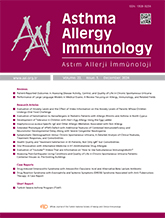


The emergence of large language models (LLMs) presents significant opportunities in healthcare and medical education. This study evaluates the performance of LLMs in medical examinations, with a specific focus on allergy, immunology, and related specialties. LLMs have developed the ability to comprehend, interpret, and process language in a manner akin to humans. This advancement raises concerns about their potential role in disciplines like medicine, which require advanced cognitive skills and a deep, specialized knowledge base. Following PRISMA guidelines, our review investigates the performance of LLMs in medical tests, highlighting both their strengths and limitations. We found that LLMs demonstrate higher accuracy on English-language assessments but exhibit significant variation in performance across different medical disciplines. This underscores the need for discipline-specific training and raises ethical considerations regarding challenges in clinical reasoning and visual interpretation. Future research should address linguistic biases, develop specialized protocols, and enhance the capacity of LLMs in immunology and allergy. This study emphasizes the potential of LLMs to transform medical education and advocates for their careful integration to ensure adequate support for healthcare professionals in managing complex allergic and immunological conditions.